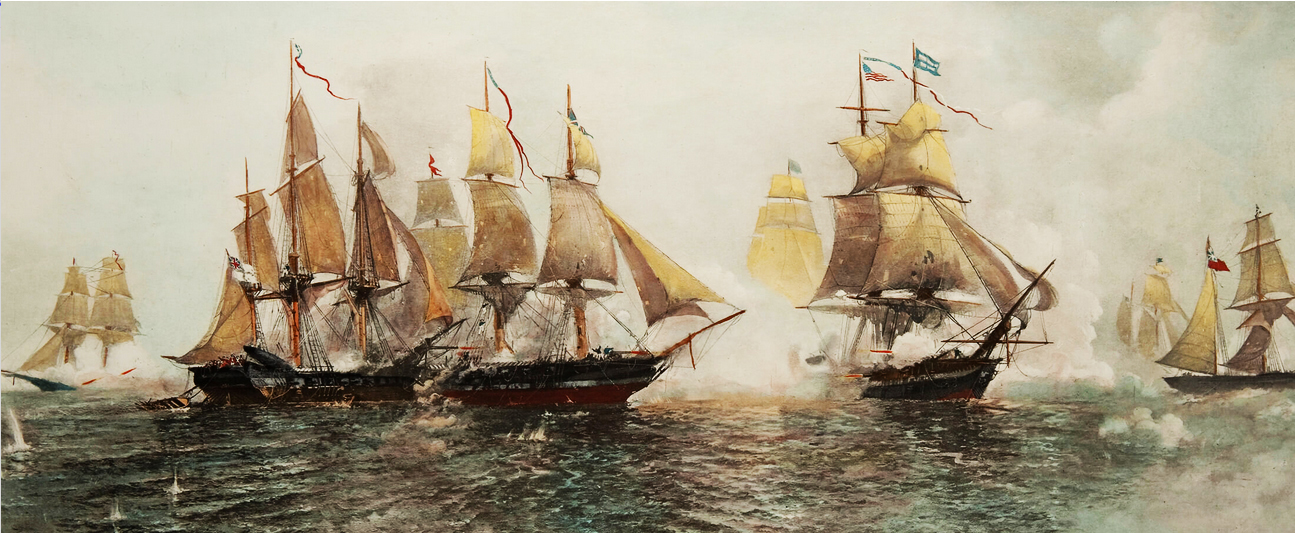
Old Ironsides earns its name on August 19, 1812
Old Ironsides earns its name: During the War of 1812,
the U.S. Navy frigate Constitution defeats the British frigate Guerrière in a furious engagement off the coast of Nova Scotia. Witnesses claimed that the British shot merely bounced off the Constitution‘s sides, as if the ship were made of iron rather than wood. By the war’s end, “Old Ironsides” destroyed or captured seven more British ships. The success of the USS Constitution against the supposedly invincible Royal Navy provided a tremendous boost in morale for the young American republic.
The Constitution was one of six frigates that Congress requested be built in 1794 to help protect American merchant fleets from attacks by Barbary pirates and harassment by British and French forces. It was constructed in Boston, and the bolts fastening its timbers and copper sheathing were provided by the industrialist and patriot Paul Revere. Launched on October 21, 1797, the Constitution was 204 feet long, displaced 2,200 tons, and was rated as a 44-gun frigate (although it often carried as many as 50 guns).
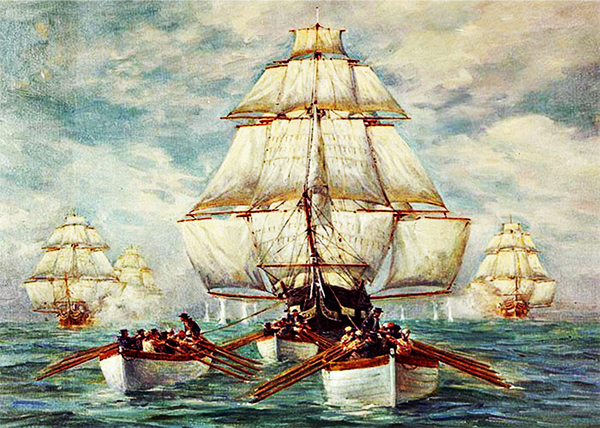
In July 1798 it was put to sea with a crew of 450 and cruised the West Indies, protecting U.S. shipping from French privateers. In 1803, President Thomas Jefferson ordered the American warship to the Mediterranean to fight Barbary pirates off the coast of Tripoli. The vessel performed commendably during the conflict, and in 1805 a peace treaty with Tripoli was signed on the Constitution‘s deck.
When war broke out with Britain in June 1812, the Constitution was commanded by Isaac Hull, who served as lieutenant on the ship during the Tripolitan War. Scarcely a month later, on July 16, the Constitution encountered a squadron of five British ships off Egg Harbor, New Jersey. Finding itself surrounded, the Constitution was preparing to escape when suddenly the wind died. With both sides dead in the water and just out of gunnery range, a legendary slow-speed chase ensued. For 36 hours, the Constitution‘s crew kept their ship just ahead of the British by towing the frigate with rowboats and by tossing the ship’s anchor ahead of the ship and then reeling it in. At dawn on July 18, a breeze sprang, and the Constitution was far enough ahead of its pursuers to escape by sail.
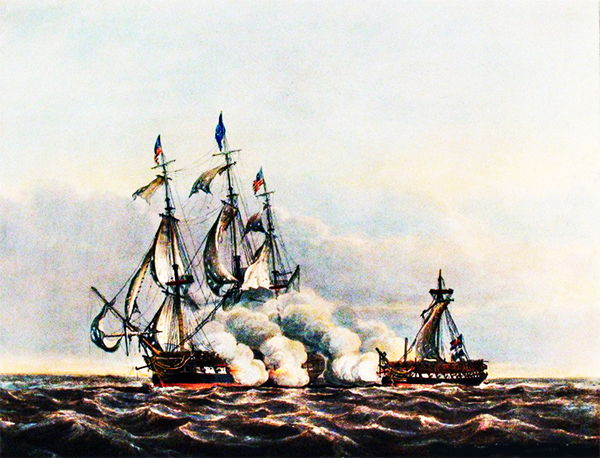
One month later, on August 19, the Constitution caught the British warship Guerrière alone about 600 miles east of Boston. After considerable maneuvering, the Constitution delivered its first broadside, and for 20 minutes the American and British vessels bombarded each other in close and violent action. The British man-of-war was de-masted and rendered a wreck while the Constitution escaped with only minimal damage. The unexpected victory of Old Ironsides against a British frigate helped unite America behind the war effort and made Commander Hull a national hero. The Constitution went on to defeat or capture seven more British ships in the War of 1812 and ran the British blockade of Boston twice.
After the war, Old Ironsides served as the flagship of the navy’s Mediterranean squadron and in 1828 was laid up in Boston. Two years later, the navy considered scrapping the Constitution, which had become unseaworthy, leading to an outcry of public support for preserving the famous warship. The navy refurbished the Constitution, and it went on to serve as the flagship of the Mediterranean, Pacific, and Home squadrons. In 1844, the frigate left New York City on a global journey that included visits to numerous international ports as a goodwill agent of the United States. In the early 1850s, it served as flagship of the African Squadron and patrolled the West African coast looking for slave traders.
In 1855, the Constitution retired from active military service, but the famous vessel continued to serve the United States, first as a training ship and later as a touring national landmark.
History Channel / Wikipedia / Encyclopedia Britannica /
Naval History and Heritage Command.mil / USS Constitution Museum.org / Battlefields.org / National Parks Service /
Old Ironsides earns its name on August 19, 1812 (YouTube) 
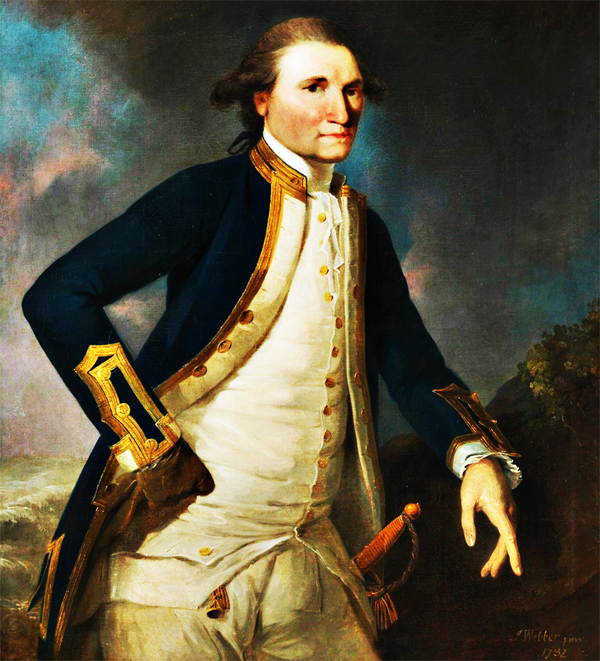
First voyage of James Cook on August 26, 1768
First voyage of James Cook: On this day, James Cook appointed to command a ship called Endeavour left Plymouth, England on August 26, 1768.
Cook joined the Royal Navy relatively late in life
Cook worked on a Yorkshire farm in his youth before winning an apprenticeship with a merchant sailing company at age 17. He cut his teeth as a mariner on shipping voyages in the choppy waters of North and Baltic Seas, and spent the next decade rising through the ranks and mastering the art of navigation.
He was being groomed to become a captain, but in 1755, he shocked his superiors by quitting his merchant sailing career and enlisting in the British Royal Navy as a common seaman.
Cook was 26 - far older than most new recruits - yet it didn’t take long for the Navy to recognize his talent. He was promoted to ship’s master in only two years, and later became one of the first men in British naval history to rise through the enlisted ranks and take command of his own vessel.
Cook was an expert mapmaker
Cook first rose to prominence as a cartographer during the Seven Years’ War, when his detailed charts of the Saint Lawrence River helped the British pull off a surprise attack against French-held Quebec.
In the early 1760s, he was given a ship and tasked with charting the island of Newfoundland off the coast of Canada. The map he produced was so accurate that it was still in use in the 20th century.
Cook’s skill at charting the seas would later become a crucial tool in his explorer’s arsenal. He won command of his first round-the-world voyage in part because he could be trusted to navigate in uncharted territory and bring home precise maps of the lands he discovered.
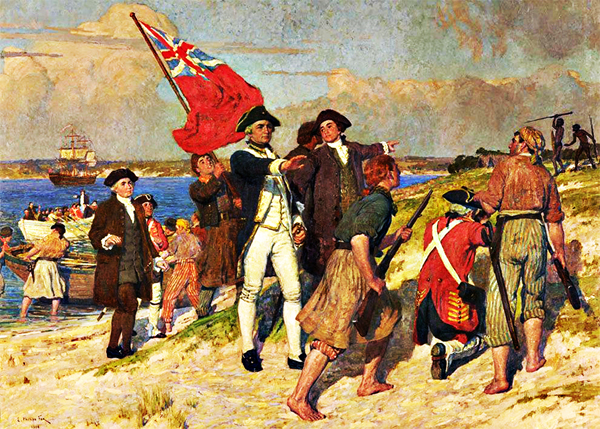
Cook’s first voyage included a secret mission from the British government
Cook’s career as an explorer began in August 1768, when he left England on HM Bark Endeavour with nearly 100 crewmen in tow. Their journey was ostensibly a scientific expedition - they were charged with sailing to Tahiti to observe the transit of Venus across the face of the sun - but it also had a hidden military agenda.
Cook carried sealed orders instructing him to seek out the “Great Southern Continent”, an undiscovered landmass that was believed to lurk somewhere near the bottom of the globe. The explorer followed orders and sailed south to the 40th parallel, but found no evidence of the fabled continent. He then turned west and circled New Zealand, proving it was a pair of islands and not connected to a larger landmass.
Cook would later resume his search for the Southern Continent during his second circumnavigation of the globe in the early 1770s, and came tantalizingly close to sighting Antarctica before pack ice forced him to turn back.
Cook's ship Endeavour nearly sank on the Great Barrier Reef
After landing in Australia during his first voyage, Cook pointed his ship north and headed for the Dutch seaport of Batavia. Because he was in unmapped territory, he had no idea he was sailing directly into the razor-sharp coral formations of the Great Barrier Reef.
On June 11, 1770, his ship Endeavour slammed into a coral reef and began taking on water, endangering both his crew and his priceless charts of his Pacific discoveries.
Cook’s men frantically pumped water out of the holds and threw cannons and other equipment overboard to lighten the ship’s weight. They even used an old sail to try and plug a hole in their hull. After more than 20 desperate hours, they finally stopped the leak and limped toward the Australian coast. It would take Cook nearly two months of repairs to make his ship seaworthy again.
Cook helped pioneer new methods for warding off scurvy
In the 18th century, the specter of scurvy - a disease caused by a lack of vitamin C - loomed over every long distance sea voyage. Cook, however, managed to keep all three of his expeditions nearly scurvy-free. This was partially because of his obsession with procuring fresh food at each of his stops, but many have also credited his good fortune to an unlikely source: sauerkraut.
While Cook didn’t know the cure or cause of scurvy, he did know that the nutrient-rich pickled cabbage seemed to keep the disease at bay, so he brought several tons of it on his voyages. His only problem was getting his crew to eat it.
To trick them, Cook simply had sauerkraut “dressed every day” for the officers’ table. When the enlisted men saw their superiors eating it, they assumed it was a delicacy and requested some for themselves
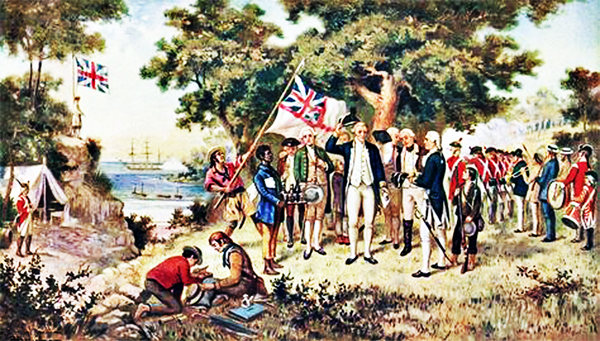
Even Britain’s enemies respected Cook
While Cook’s journeys took place during a time when Britain was variously at war with the United States, Spain and France, his reputation as a pioneering explorer allowed him to travel the seas with relative impunity.
In July 1772, a squadron of Spanish vessels briefly detained his ships, only to release them after they realized Cook in command.
Likewise, when Cook’s third voyage set sail during the American Revolution, Benjamin Franklin wrote a memo to colonial ship captains instructing them to treat the British vessels as “common friends to mankind” if they encountered them at sea.
Cook searched for the Northwest Passage
In 1776, a 47-year-old Cook set sail on his third voyage of discovery—this time a search for the elusive Northwest Passage in the Arctic.
After traveling halfway around the world, he led the ships HMS Resolution and Discovery on a perilous survey of the upper coasts of western Canada and Alaska.
Cook came within 50 miles of the western entrance to the passage, but his attempts to locate it were ultimately thwarted by freezing weather, violent currents and heavy ice floes in the Bering Sea.
When the extreme conditions drove his crew to the brink of mutiny, Cook reluctantly turned south for the summer. He would die before he had a chance to resume his search.
Natives mistook him for a god when he landed in the Hawaiian Islands
During Cook’s third voyage, he became the first European to set foot on Hawaii, which he called the “Sandwich Islands” after his patron the Earl of Sandwich
Hawaiians at Kealakekua Bay celebrated Cook’s January 1779 landing with joyous celebrations, and for good reason: by some strange coincidence, the explorer’s arrival coincided with an annual festival honoring the Hawaiian fertility god Lono.
Since the natives had never seen white men or massive sailing ships like Cook’s, they assumed he was their deity and lavished him with feasts and gifts.
The Europeans responded by greedily stripping Kealakekua of food and supplies, but when one of Cook’s sailors died from a stroke, the natives realized the strangely dressed Europeans weren’t immortals after all. From then on, Cook’s relationship with the Hawaiians became increasingly strained.
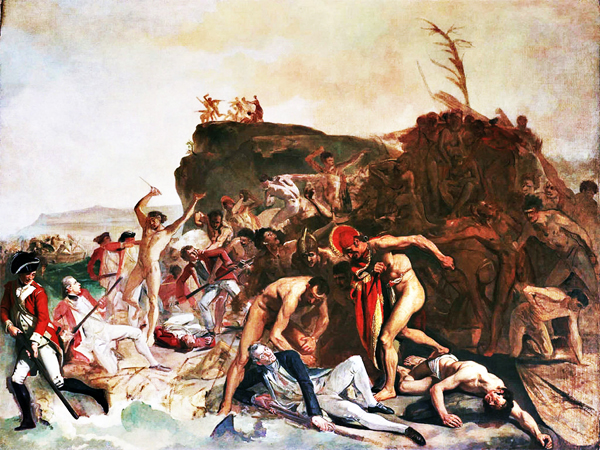
Cook suffered a grisly death
While docked for repairs in Hawaii in February 1779, Cook became enraged after a group of natives stole a cutter ship from one of his boats. He went ashore and tried to take King Kalani‘ōpu‘u hostage, but the Hawaiians feared their leader would be killed and swarmed to his aid.
When Cook’s ship Discovery fired its cannons at another group of Hawaiians, the explorer panicked and discharged a rifle before fleeing to a waiting boat. He didn’t get far before he was pelted by stones and struck by a club.
A Hawaiian warrior then brandished a knife - a gift from Cook - and plunged it into his back. Cook fell into the surf and was repeatedly stabbed and bashed with rocks.
After he perished, the Hawaiians ritualistically prepared his corpse as they would that of a king. They preserved his hands in sea salt, then roasted the rest of his body in a pit before cleaning his bones.
NASA named spacecraft after Cook's ships
Cook explored and mapped more territory than any navigator of his era, and his achievements later saw him honored by NASA.
Cook’s HMS Discovery was one of several historical vessels that inspired the name of the third space shuttle, and NASA later named their final shuttle “Endeavour” after the ship he commanded on his first circumnavigation of the globe.
When the shuttle Discovery made its final space flight in 2011, its crew carried a special medallion made by the Royal Society in honor of Cook.
History Channel / Wikipedia / Encyclopedia Britannica /
Princeton.edu / Captain Cook Society / Smithsonian.edu / Gutenberg.org /
First voyage of James Cook on August 26, 1768 (YouTube) 
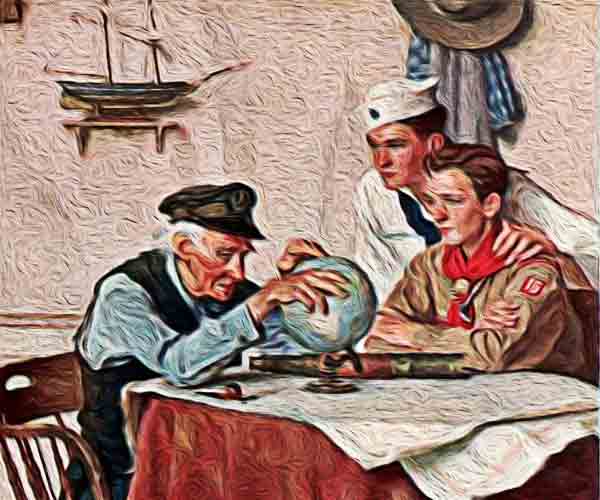
Understanding Military Terminology
Rehabilitative Care
(DOD) Therapy that provides evaluati ons and treatment programs using exercises, massage, or electrical therapeutic treatment to restore, reinforce, or enhance motor performance and restores patients to functional health allowing for their return to duty or discharge from the Service.
Also called Restorative Care.
See also Patient Movement Policy; Theater.
Joint Publications (JP 4-02) Joint Health Services - Intelligence Resource Program
Rehearsal Phase
(DOD) In amphibious operations, the peri od during which the prospective operation is practiced.
See also Amphibious operation.
Joint Publications (JP 3-02) Amphibious Operations
Joint Publication - Department of Defense Dictionary of Military and Associated Terms
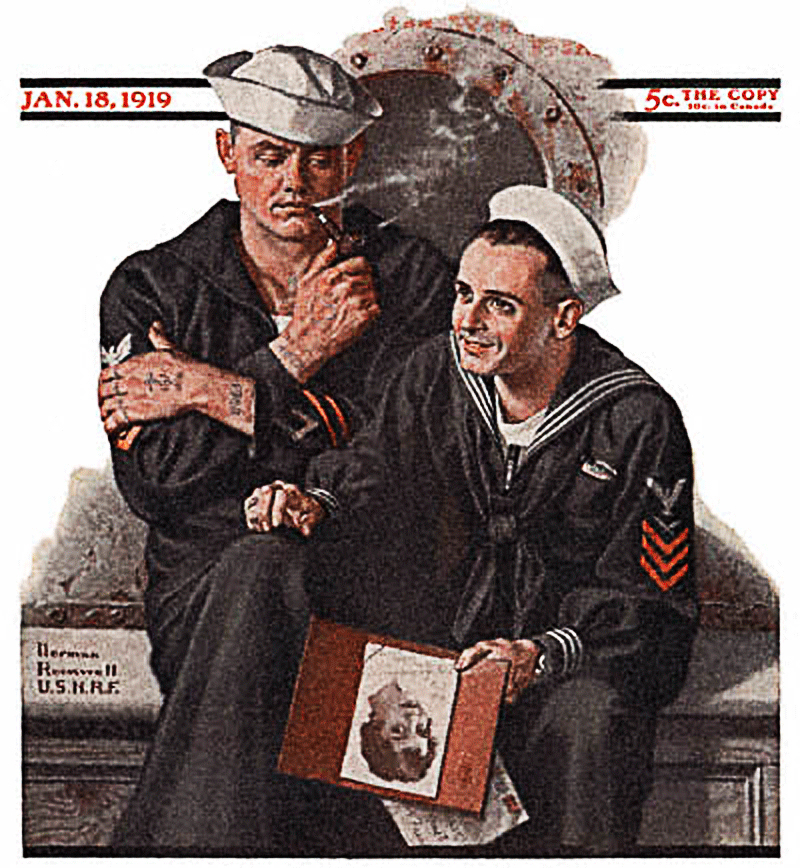
The Old Salt’s Corner

“SAILOR'S CHRISTMAS”
T'was the night before Christmas, he lived in a crowd,/p>
In a 40 man berthing, with shipmates snoring so loud.
I had come down the Sail with presents to give,
And to see just who in this rack did live.
I looked all about, a strange sight did I see,
No tinsel, no presents, not even a tree.
No stockings were hung, just a “poopy suit” close at hand,
On the bulkhead hung pictures of a far distant land.
He had medals and badges and awards from far and wide,
But one in particular my eye did soon find.
Why, they were Dolphins, with a tiny submarine...pinned on with pride,
Then a sobering thought did come to my mind.
For this place was different, it was so dark and dreary,
I had found the home of a Sub Sailor, once I could see clearly.
The Sailor lay sleeping, silent and alone,
Curled up in his rack, dreaming of home.
The face was so gentle, the berthing in good order,
Not how I pictured a U. S. Submarine Sailor.
Was this the hero whom I saw on TV?
Defending his country so we all could be free?
I realized the families that I've seen this cold night,
Owed their lives to these Sailors who were willing to fight.
“You've got high dust and low dust, and that overhead it needs cleaning!”
Soon, 'round the world the children would play,
And grownups would celebrate a new Christmas Day.
They all enjoyed freedom each day of the year
Because of these Sailors, like the one lying here.
I couldn't help but wonder how many lay alone,
On a cold Christmas Eve, under sea, far from home.
The very thought made me pause and brought a tear to my eye,
I dropped to my knees and started to cry.
The Sailor awakened and I heard a gruff voice
“Santa, don't cry for me; this life is my choice.
I'll defend the seas on this day
Then on re-inspection he explained with a huff,
And let others rejoice.”
The Sailor rolled over and drifted to sleep,
I couldn't control it, I started to weep.
I kept watch then for hours, silent and still,
And we both shivered a bit from the night's aching chill.
It seemed like eternity until reveille sounded
I didn't want to leave, on that dreary, cold night,
This Guardian of Honor, so willing to fight.
Then the Sailor rolled over and with a voice soft and pure,
Whispered, “Carry on, Santa, it's Christmas Day... all's secure.”
~ Unknown

“I’m Just Sayin”
“It is a wise father that knows his own child.”
“Hell is empty and all the devils are here.”
“Better three hours too soon than a minute too late.”
“Though she be but little, she is fierce.”
“Some rise by sin, and some by virtue fall.”
“A fool thinks himself to be wise,
but a wise man knows himself to be a fool.”
“The robbed that smiles,
steals something from the thief.”
“We know what we are,
but know not what we may be.”
“Some are born great,
some achieve greatness,
some have greatness thrust upon them.”
~ William Shakespeare

“Thought for the Day”
“The only thing necessary for the triumph of evil is for good men to do nothing.
“Nobody made a greater mistake than he who did nothing because he could do only a little.”
“You can never plan the future by the past.”
“Good order is the foundation of all things.”
“Nothing turns out to be so oppressive and unjust as a feeble government.”
“Education is the cheap defense of nations.”
“Facts are to the mind what food is to the body.”
“No passion so effectually robs the mind of all its powers of acting and reasoning as fear.”
“Whenever a separation is made between liberty and justice,
neither, in my opinion, is safe.”
“He that wrestles with us strengthens our nerves and sharpens our skill.
Our antagonist is our helper.”
“When bad men combine,
the good must associate;
else they will fall one by one,
an unpitied sacrifice in a contemptible struggle.”
“Hypocrisy can afford to be magnificent in its promises,
for never intending to go beyond promise,
it costs nothing.”
“When the leaders choose to make themselves bidders at an auction of popularity,
their talents, in the construction of the state,
will be of no service.
They will become flatterers instead of legislators;
The instruments, not the guides, of the people.”
~ Edmund Burke

“What I Learned”
“Common sense is not so common.
“Those who can make you believe absurdities can make you commit atrocities.”
“Judge a man by his questions rather than his answers.”
“Every man is guilty of all the good he did not do.”
“It is difficult to free fools from the chains they revere.”
“It is dangerous to be right in matters on which the established authorities are wrong.”
“No problem can withstand the assault of sustained thinking.”
“Faith consists in believing when it is beyond the power of reason to believe.”
“If God did not exist, it would be necessary to invent Him.”
“God gave us the gift of life;
it is up to us to give ourselves the gift of living well.”
“To the living we owe respect,
but to the dead we owe only the truth.”
“It is forbidden to kill;
therefore all murderers are punished unless they kill in large numbers and to the sound of trumpets..”
“God is not on the side of the big battalions,
but on the side of those who shoot best.”
“Each player must accept the cards life deals him or her:
but once they are in hand,
ihe or she alone must decide how to play the cards in order to win the game.”
~ Voltaire
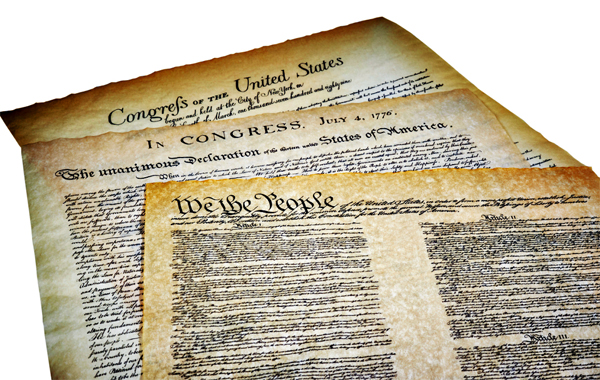
Mr. Answer Man Please Tell Us: What Was the Original Reason for the 25th Amendment?
SECTION 1: “IN CASE OF THE REMOVAL OF THE PRESIDENT FROM OFFICE OR OF HIS DEATH OR RESIGNATION, THE VICE PRESIDENT SHALL BECOME PRESIDENT”
SECTION 2: “WHENEVER THERE IS A VACANCY IN THE OFFICE OF THE VICE PRESIDENT, THE PRESIDENT SHALL NOMINATE A VICE PRESIDENT WHO SHALL TAKE OFFICE UPON CONFIRMATION”
SECTION 3 and 4: “WHENEVER THE PRESIDENT TRANSMITS … HIS WRITTEN DECLARATION THAT HE IS UNABLE TO DISCHARGE THE POWERS AND DUTIES OF OFFICE … SUCH POWERS AND DUTIES SHALL BE DISCHARGED BY THE VICE PRESIDENT AS ACTING PRESIDENT” AND “WHENEVER THE VICE PRESIDENT AND A MAJORITY OF EITHER THE PRINCIPAL OFFICERS OF THE EXECUTIVE DEPARTMENTS TRANSMIT … THAT THE PRESIDENT IS UNABLE TO DISCHARGE THE POWERS AND DUTIES OF HIS OFFICE, THE VICE PRESIDENT SHALL IMMEDIATELY ASSUME THE POWERS AND DUTIES OF THE OFFICE AS ACTING PRESIDENT”
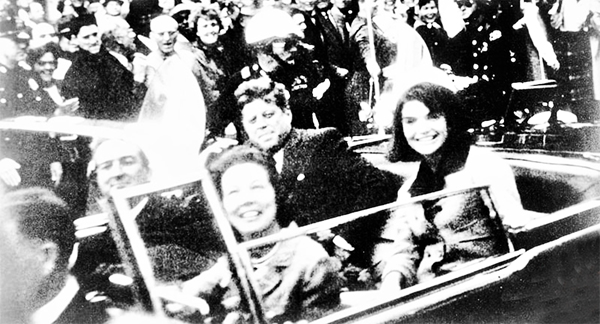
The 25th Amendment clears up some ambiguity about the temporary or permanent absence of the President from office and, if permanently disabled from office, provides for appointment of a Vice President.
It strengthens and clarifies the line of succession as well as provides for temporary inabilities to carry out Presidential duties, such as a President undergoing a medical procedure or operation.
A President could die in office -- as has happened several times before — or be removed (impeached) and the original Constitution didn’t specify whether the Vice President was simply saddled with the duties of President or was elevated to the position of President. The 25th Amendment makes it clear that the VP becomes President.
Moreover, it also provides that the President may appoint a new Vice President to fill the vacancy in the Vice Presidential office, subject to confirmation and approval by Congress. This occurred after Richard Nixon resigned in 1974 and VP Gerald Ford assumed the Presidency, using his 25th Amendment power to appoint Nelson Rockefeller as VP.
If a President knows that he will be temporarily incapacitated for some reason, under the Amendment he notifies the leaders of both Congressional houses by written letter. He can specify when the transfer of power to his Vice President becomes effective in the letter too. Once he’s able to resume the duties of the office, he would then send letters to that effect to the same Congressional leaders. This would be the case if the President knew he was to be anesthetized for a medical procedure. Once he’s awake and recovering and his doctors believe he’s fit enough, he can “reclaim” his office.
The most interesting provision allows for the Vice President and a majority of either the principal officers of the executive departments (or of such other body as Congress may by law provide) to declare the president unable to discharge the powers and duties of his office by written declaration to the leaders of each Congressional house (i.e. the President pro tempore of the Senate and the Speaker of the House of Representatives).
Originally it was intended as a means to allow official transfer of power to the Vice President if the president became too injured or ill to sign such letters himself - think of a heart attack or stroke. This section allows the President to reclaim his office if he recovers. But this could also be invoked if a President exhibits signs of dementia or possibly “mental illness”. It also provides that if the President is removed under this section, if he attempts to reclaim the office, the same officers can object, in which case Congress will decide the matter (and you thought the IRS hearings were a circus!). It’s about the equivalent to having the President “relieved of his command” as military officers might do in the event a commander is unfit or unable to do his job.
The 25th Amendment doesn’t directly negate Article II, Section 1, Clause 6 of the Constitution (the old provisions) or the statutes enacted by Congress outlining the line of succession should both the President and VP be unable to fulfill their roles.
Constitution Daily.org
• Constitution Laws
• Ford Library Museum.gov
• Quora
• Wikipedia
• 25th Amendment (YouTube) 

NAVSPEAK aka U.S. Navy Slang
VC: A Viet Cong: Guerilla forces in South Vietnam allied with the North Vietnamese Army (NVA) during the Vietnam War. Also called “Charlie” from phoenetic “Victor Charlie”.
VC: Fixed Wing Composite aircraft squadrons.
VD: Venereal Disease, also know as the clap, Gonnorea or syphillis.
Veal Wheels: Veal Parmesan. A.K.A. Elephant Scabs.
VERTREP: Vertical Replenishment: The taking of supplies (resupply) from a supply ship via helo pick-up and drop-off. Historically, the CH-46 Sea Knight (see “Phrog”) was used for such resupply, although any aircraft with a cargo hook installed can do. Differs from “UNREP”.
Very well: Expression of acknowledgement a senior gives a subordinate6.
VF: Fixed Wing Fighter Aircraft Squadrons. No longer in use, see VFA.
VFA: Fixed Wing Strike Fighter Squadron, made up of Legacy F/A-18C or D model Hornets or F/A-18E,F or G model Super Hornets.
Vitamin M: Motrin, which is occasionally used to combat the various aches/pains/headaches associated with military service. Compare “Corpsman Candy”.
VP: Fixed Wing Patrol Aircraft Squadrons.
VS: Fixed Wing Anti Submarine Squadrons. With the retirement of the S-3B Viking all VS squadrons have been decommissioned.
VT: Fixed Wing Training Squadrons..
VX: Fixed Wing Experimental Aircraft Squadrons..
Vulcan Death Watch: 12 hours of drills separated by 3 rotations of watches. If one is on Vulcan Death Watch, one is up oncoming as drill team, on watch then offgoing as casualty response team, potentially followed by another 6 hour watch.
Vultures' Row: The place from which people can watch flight operations without being in the way, typically the O-7 to O-9 level on an aircraft carrier's island.
Wiktionary.org

Just for you MARINE
VERTREP: Vertical Rreplenishment, the use of helicopters for cargo transfer to ships or distant outposts.
VEERP: Voluntary Enlisted Early Release Program, getting out of the Marine Corps early.
Voluntold: Being volunteered for a task without having a choice by a superior.
VTOL: Vertical TakeOff/Landing, takeoff and landing technique that does not need a runway to become airborne. See also STOL, STOVL, & V/STOL.
V/R: Very Respectfully, used as an end greeting in written naval communication to senior.
V/STOL: Vertical/Short Takeoff and Landing, a type of aircraft that can perform: STOL, STOVL, & VTOL.
Wikipedia.org
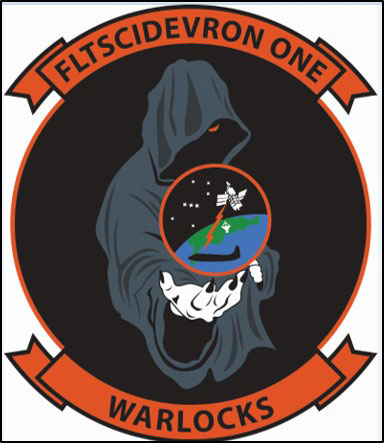
Naval Aviation Squadron Nicknames
VXS-1 Naval Aviation Squadron Nicknames: Air Test and Evaluation (VXS) Squadron ONE - nicknamed the “Dust Devils”
United States Navy - Unmanned Aircraft Systems Test Naval Research Laboratory - Washington, D.C. / December 13, 2004 - present
Wikipedia.org

Where Did That Saying Come From?

“An Englishman's home is his castle:”
Meaning: The English dictum that a man's home is his refuge.
History: The maxim that 'An Englishman's home (or occasionally, house) is his castle' is most often cited these days in articles in the British right-wing press that bemoan the apparent undermining of the perceived principle that a man can do as he pleases in his own house, which they hold up as an ancient right.
The grumbles centre about the feminist response 'what about Englishwomen?' and the public disquiet about the smacking of children, attacking of intruders etc.
The proverb was used in almost all of the articles about the court case of Tony Martin in 2000.
Martin was convicted by jury trial of murder, after shooting and killing a 16-year old who had broken into his house in Norfolk, UK.
Did Englishmen actually ever have a unique right to act as they pleased within the walls of their own home? Well, yes and no.
Yes, in the sense that it has been a legal precept in England, since at least the 17th century, that no one may enter a home, which would typically then have been in male ownership, unless by invitation.
This was established as common law by the lawyer and politician Sir Edward Coke (pronounced Cook), in The Institutes of the Laws of England, 1628:
“For a man's house is his castle, et domus sua cuique est tutissimum refugium [and each man's home is his safest refuge].”
This enshrined into law the popular belief at the time, expressed in print by several authors in the late 16th century:
Henri Estienne's The Stage of Popish Toyes: conteining both tragicall and comicall partes, 1581, includes:
“[The English papists owe it to the Queen that] "youre house is youre Castell."”

Richard Mulcaster, the headmaster of Merchant Taylors' School in London, echoed this in his treatise on education - Positions, which are necessarie for the training up of children, 1581:
“He [the householder] is the appointer of his owne circumstance, and his house is his castle.”
Judged against the standards of his time, Mulcaster was an enlightened educationalist. His charges were nevertheless terrified of him and he condoned methods in the 'castle' of his school that would result these days in a visit from Social Services.
His own experience in castles wasn't that happy either - he was imprisoned for theft in 1555 in the Tower of London and probably tortured into a confession.
What was meant by 'castle' was defined in 1763 by the British Prime Minister with an admirable selection of names to choose from - William Pitt, the first Earl of Chatham, also known as Pitt the Elder:
“The poorest man may in his cottage bid defiance to all the forces of the crown. It may be frail - its roof may shake - the wind may blow through it - the storm may enter - the rain may enter - but the King of England cannot enter.”
It is clear from the above that the law was established to give householders the right to prevent entry to their homes. Like the 'rule of thumb', which was popularly and mistakenly believed to be the right of a man to beat his wife, the 'Englishman's home is his castle' rule didn't establish a man's right to take actions inside the home that would be illegal outside it.
Exalt the citizen. As the State is the unit of government he is the unit of the State. Teach him that his home is his castle, and his sovereignty rests beneath his hat.
The principle was exported to the United States where, not unnaturally, the 'Englishman' was removed from the phrase. In 1800, Joel Chandler Harris's biography of Henry W. Grady, the journalist and writer on the US Constitution, included this line:
“Exalt the citizen. As the State is the unit of government he is the unit of the State. Teach him that his home is his castle, and his sovereignty rests beneath his hat.”
These days, with all the news of banking collapses and mortgage foreclosures, men and women, English or American, might be glad to have somewhere to call home, even if they have to obey the law when inside it.
Phrases.org UK

Science & Technology

FEATURED: Genes that may be helping bumblebees adapt to environmental change pinpointed
• The tiny structures that mimic a cell's natural environment
Scientists discover new mechanism involved in learning and memory
• Higher temperatures may decrease antidepressant pollution in waterways
• Co-occurring droughts could threaten global food security
Scientists create a global repository for cell engineering
• Ranking the efficacy of hair loss drugs
• Tiny antenna enables portable biomedicine, food analysis, and other nano- and terahertz technologies
Protective mutations in COVID-19
• Can we harness intestinal cells to treat endocrine disorders?
• Researchers restore function in a gene that can suppress liver cancer and enhance immunotherapy
Phys.org / MedicalXpress / TechXplore

FEATURED: A noninvasive iRFP713 p53 reporter reveals dynamic p53 activity in response to irradiation and liver regeneration in vivo
• Chasing after methane’s ultra-emitters
European fusion reactor sets record for sustained energy
• A Beijing think tank offered a frank review of China’s technological weaknesses. Then the report disappeared
Can scientists repair their relationship with Native people as they probe the past?
• These sponges survive the deep sea by feeding on remains of long-dead animals
Next-generation spinal implants help people with severe paralysis walk, cycle, and swim
• A human antibody reveals a conserved site on beta-coronavirus spike proteins and confers protection against SARS-CoV-2 infection
Science AAAS

Bizarre News (we couldn’t make up stuff this good - real news story)
Do we live in a simulation? Here's why we may never know.

Let's say we build some ridiculous planet-sized computer - one so powerful it could simulate our entire universe.
Is everything we know and experience, up to and including reality itself, a simulation created by some unseen and unknowable entity? This idea, known as the simulation hypothesis, was first posed by University of Oxford professor Nick Bostrom in 2003.
But does the simulation hypothesis offer a compelling argument, or is it just interesting food for thought? Let's find out.

Let's assume our computers will continue to grow ever more powerful, efficient and capable. Let's say that at some point in the deep, deep future (for this argument to work, it doesn't matter exactly when this happens), we build some ridiculous planet-sized computer - a computer so powerful that it could simulate our entire universe, recreating all the physics, chemistry and biology that we experience in the natural world.
If we also assume that consciousness is consciousness, regardless of where it resides (in either an organic brain or a digital one), then any simulated entities within the computer that gain consciousness will experience a world that is indistinguishable from ours.
You know, the Matrix.
Once our descendants build such a computer, they will inevitably create countless simulated beings - just try to count how many creatures in video games have appeared and disappeared since we first developed the technology.

Very quickly, the number of simulated conscious brains living in a computer will vastly outnumber the organic brains living in the real universe. If this ends up happening, we are left with three possibilities:
1. Our descendants (or other intelligent beings in the universe) will never be able to develop the technological ability to faithfully simulate the cosmos.
2. Our descendants (or other intelligent beings in the universe) will develop the technology but choose not to simulate the cosmos.
3. The vast majority of all conscious entities, including you, are living in a simulation.
The simulation argument is the latest in a long tradition of philosophical thinking that questions the ultimate nature of the reality we experience. Through the ages, philosophers have wondered if our reality is the construct of a malicious demon, or if we live inside of someone else's dream. It's the ultimate form of skepticism and is useful to remind ourselves that there are limits to the empirical study of nature.
As philosophical arguments go, the simulation hypothesis is a good one. But the hypothesis ends with a trilemma - three statements, one of which must be true (if you accept all the assumptions in the argument), but we can't tell which one.
You're allowed to throw your hands up and say you don't know which possibility is the most likely to be correct. You're also allowed to argue for one option over another. For example, you could say that computers will never be powerful enough to faithfully simulate the universe or that advanced civilizations will always find it morally reprehensible to simulate consciousness. Or you could say it's all inevitable and we do live in somebody else's simulation of a universe.
No matter which option you choose, however, you need to bring in extra arguments beyond the original simulation hypothesis. Or, you could question the assumptions that go into the argument itself.

Resetting the computer
Perhaps the biggest assumption in the simulation hypothesis is that simulated brains will quickly overwhelm the number of organic brains. Assuming that there are no differences between the experiences of simulated and organic consciousness (another big assumption), this is what allows you to calculate the odds that you live in a simulation. In the far future, for example, there could be 99 billion simulated conscious beings for every 1 billion organic ones. That would mean there's a 99% chance that you are among the simulated ones.
But in 2017, Brian Eggleston, an undergraduate systems analysis student at Stanford University, discovered a major flaw in Bostrom's accounting. The simulation argument relies on our descendants building superadvanced computers, because we are the only known species to build computers in the first place. Once our descendants build such computers, we'll know for sure that we're not among the simulated beings in those computers, because we can point to those computers and conclusively say we're not inside them.
No matter how many simulated conscious entities our descendants make, whether 10 or 10 trillion, we can't use them to calculate the odds that we are in a simulation. In other words, their future ability to create simulated universes doesn't tell us a single thing about whether we are in a simulation. We can't use the future numbers to calculate odds. And if we can't calculate the odds, we don't have a trilemma and thus can't say anything more.
Instead, we can only look to our past - either humans living in some time before us (in a nonsimulated, real universe) or some alien creatures who enjoy making simulated humans. While either of those realities is possible, we have absolutely no evidence that either is true, and we have no way to calculate the number of simulated entities in existence.
Do we live in a simulation? Ultimately, we don't know, and the simulation hypothesis doesn't provide a compelling argument that we might. So you can go back to enjoying your life.
Related: If the universe is a giant computer simulation, here's how many bits would be required to run it
Our expanding universe: Age, history & other facts
Could the moon ever be pushed from orbit, like in “Moonfall”?
Watch thousands of “vinegar eels” swarm through a water droplet in amazing new video
Live Science (01/31/2022) 



“For Your Love” - The Yardbirds
Album: For Your Love
Released 1965 
“For Your Love”  was written by Graham Gouldman, who later became the bass player for the group 10cc; he wrote two other Yardbirds hits as well:
“Heart Full of Soul”
was written by Graham Gouldman, who later became the bass player for the group 10cc; he wrote two other Yardbirds hits as well:
“Heart Full of Soul”  and
“Evil Hearted You”
and
“Evil Hearted You”  .
.
Musically, Gouldman was inspired by The Animals' version of
“The House Of The Rising Sun” 
“There's a general sort of popular chord sequence which is C, A minor, F and G”, he Gouldman told Songfacts. “Well, ‘House Of The Rising Sun» is pretty much the opposite of that. So, it starts on a minor and goes to the relative major instead of the other way around, and I really responded to that, it resonated with me. I became so enamored with the sequence that I used it on the first two chords of ‘For Your Love’.
“For Your Love”  is one of the most famous rock songs to feature a harpsichord, which was arranged by Yardbirds bassist Paul Samwell-Smith”, who made wholesale changes to Graham Gouldman's original demo.
is one of the most famous rock songs to feature a harpsichord, which was arranged by Yardbirds bassist Paul Samwell-Smith”, who made wholesale changes to Graham Gouldman's original demo.
Gouldman observed to Uncut magazine August 2009:
“The harpsichord was an absolute stroke of genius. The record just had a weird, mysterious atmosphere about it.”
The Yardbirds wrote many of their own songs as a group, but had some of their biggest hits with the ones Gouldman wrote.
What did they think of Gouldman's songs? Yardbirds drummer Jim McCarty told:
“Well, they were always very original. Very interesting songs, very moody, because they were usually in a minor key, the ones we did, anyway. ‘For Your Love’ was an interesting song, it had an interesting chord sequence, very moody, very powerful. And the fact that it stopped in the middle and went into a different time signature, we liked that, that was interesting. Quite different, really, from all the bluesy stuff that we'd been playing up till then. But somehow we liked it. It was original and different.”
The Yardbirds didn't have a lot of hits, but were one of the most influential and original bands of the '60 and an easy pick for the Rock and Roll Hall of Fame, which they entered in 1992. Having a hit song was important to them, however, and this song provided that. Jim McCarty told Songfacts:
“To try and get a hit song in those days was quite a difficult thing to do for us. We could come up with ideas, but our first hit song was very important for us. And with ‘For Your Love’ we heard it and had the demo of it and it sounded like a hit song to all of us.
Yeah, there wasn't a problem doing that. It was the sort of thing that you relied on to get into that other echelon, to have a hit song. All our contemporaries were having hit songs:
The Beatles and The Stones and The Moody Blues and The Animals, they were all having #1 hits and we were really trying to keep up.”
“For Your Love”  almost didn't get recorded by The Yardbirds.
Gouldman, 19 at the time, wrote it for his own group The Mockingbirds, but their demo was turned down by Columbia. Also it is believed that producer Mickie Most turned it down on behalf of Herman's Hermits and that the Animals also turned it down.
almost didn't get recorded by The Yardbirds.
Gouldman, 19 at the time, wrote it for his own group The Mockingbirds, but their demo was turned down by Columbia. Also it is believed that producer Mickie Most turned it down on behalf of Herman's Hermits and that the Animals also turned it down.
The song found its way to The Yardbirds after their manager ran into the fledgling songwriter Gouldman when they were opening for The Beatles at a 1964 Christmas show.
Gouldman loved how The Yardbirds would change tempo in the middle of a song, which is how he wrote “For Your Love”.
This song prompted Eric Clapton to leave The Yardbirds, since he felt their music was becoming too commercial.
He was replaced by Jeff Beck, who was later replaced by Jimmy Page. Clapton joined John Mayall's Bluesbreakers and would later be a member of Cream and Derek and the Dominos.
One of the contributing factors to Eric Clapton's departure was, while performing the song live, his having to recreate the song's harpsichord on a 12-string guitar.
The harpsichord on this song was played by session musician Brian Auger, who later became a solo artist of note. His biggest hit was the Bob Dylan song
“This Wheel's On Fire”  , which was credited to Julie Driscoll With Brian Auger And The Trinity. It later became the theme tune for the BBC comedy show Absolutely Fabulous.
, which was credited to Julie Driscoll With Brian Auger And The Trinity. It later became the theme tune for the BBC comedy show Absolutely Fabulous.
The Yardbirds were known as a great live band, but the recording technology of 1965 limited their commercial potential, as the songs they wrote themselves didn't play well in a studio setting.
McCarty told us how this song gave them a breakthrough:
“All the stuff that we played live and we recorded in the studio, it just sounded really tame. The studios weren't so good then, they weren't really geared for playing rock and roll or blues music. And all the ideas that we'd had up to ‘For Your Love’ just sounded awful. And so ‘For Your Love’ was the song that would sound good anyway, because it was a much more commercial song.”
On The Yardbirds official site, bass player Chris Dreja said of this:
“We owe a lot to that song because it sort of pulled us out from national to international and set the template for us - that time change in the middle, the weirdness of it.”
This song appeared in the movies “Fear And Loathing In Las Vegas” (1998), “Harimu Ogen” (1985) and “Deadly Advice (”1994).
Fleetwood Mac recorded
“For Your Love”  for their 1973 album “Mystery to Me” and released it as a single.
for their 1973 album “Mystery to Me” and released it as a single.
Continued ...
MORE SONGS
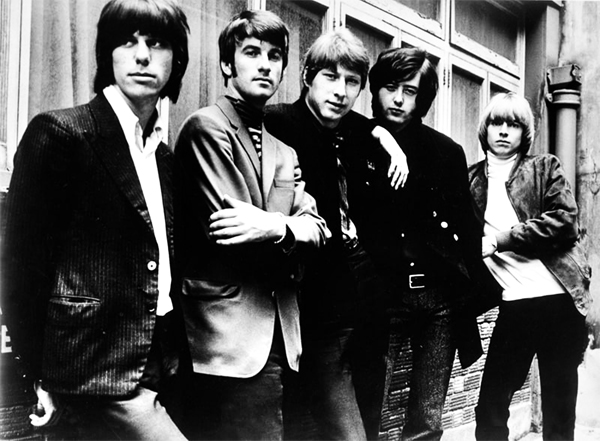
1964
“I'm A Man”  Live
Live 
“I Wish You Would”  Live
Live 
“Smokestack Lightning”  Live
Live 
“Five Long Years”  Live
Live 
“Louise”  Live
Live 
“[She's So] Respectable”  Live
Live 
“A Certain Girl” 
“Got Love If You Want It” 
“My Girl Sloopy” 
“Too Much Monkey Business” 
“Good Morning Little Schoolgirl” 
1965
“For Your Love”  Live
Live 
“Heart Full of Soul”  Live
Live 
“I'm Not Talking”  Live
Live 
“Mr. You're a Better Man Than I”  Live
Live 
“Still I'm Sad”  Live
Live 
“The Train Kept A Rollin'”  Live
Live 
“Got To Hurry ” 
“I Ain't Got You” 
“Putty (In Your Hands)” 
1966
“Over, Under, Sideways, Down”  Live
Live 
“Shapes of Things”  Live
Live 
“The Nazz Are Blue”  Live
Live 
“Turn Into Earth”  Live
Live 
“Happenings Ten Years Time”  Live
Live 
“Jeff’s Boogie”  Live
Live 
“Psycho Daisies” 
1967
“Dazed and Confused”  Live
Live 
“White Summer”  Live
Live 
“Drinking Muddy Water” 
“Tinker Tailor Soldier Sailor” 
“For Your Love” - Yardbirds in 1964 - 1967
The Yardbirds official site (The Yardbirds Discography) / Rock & Roll Hall of Fame / Billboard / All Music / Song Facts /
Ultimate Classic Rock / The Yardbirds
Image: “For Your Love (album)” by The Yardbirds
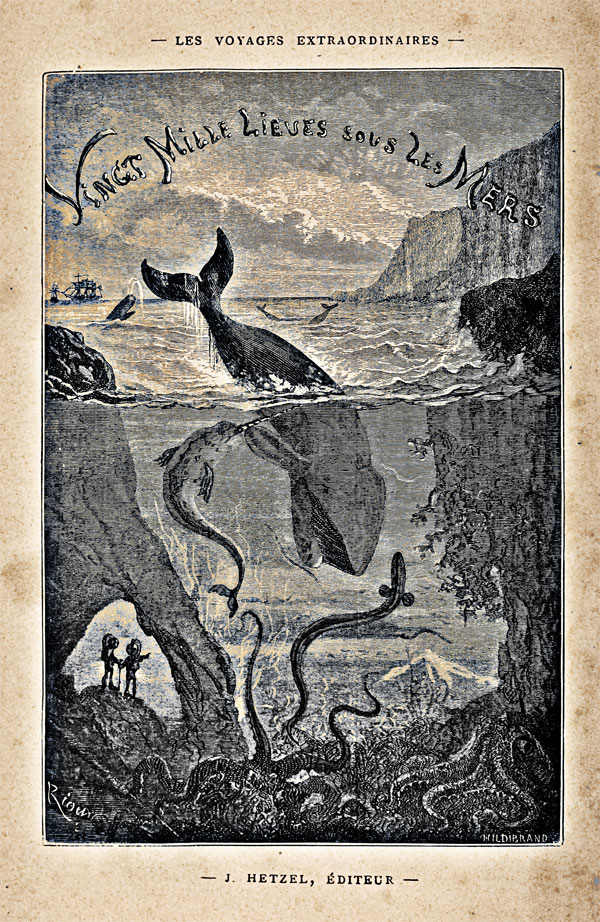
Trivia
● How many land miles are there in a league?
Answer to Trivia
READ MORE: Encyclopedia Britannica
● What wonder of the ancient world was destroyed by arson the same night Alexander the Great was born?
Answer to Trivia
READ MORE: World History Encyclopedia.org
● How many stars are in the Big Dipper constellation?
Answer to Trivia
READ MORE: Space.com
● Which writer coined the word “Cyberspace”?
Answer to Trivia
READ MORE: The Marginalian.org
● Tootsie Rolls candy was named after whom?
Answer to Trivia
READ MORE: Candy Hall of Fame.org

A Test for People Who Know Everything
From the Jeopardy Archives Category - “FOR GOOD MEASURE” ($200)
“This metric unit of liquid measure is equal to approximately 1.057 quarts.”
Answer to Jeopardy READ MORE: Metric-Conversions.org
From the Jeopardy Archives Category - “FOR GOOD MEASURE” ($400)
“1,728 cubic inches is equal to one of these.”
Answer to Jeopardy READ MORE: Metric-Conversions.org
From the Jeopardy Archives Category - “FOR GOOD MEASURE” ($600)
“1 Mickey, or about 0.1 millimeter, is defined as the smallest detectable movement of one of these computer devices.”
Answer to Jeopardy READ MORE: Computer History.org
From the Jeopardy Archives Category - “FOR GOOD MEASURE” ($800)
“Used to measure the height of horses from the ground to the top of the shoulders, one of these units equals 4 inches.”
Answer to Jeopardy READ MORE: Illustrative Mathematics.org
From the Jeopardy Archives Category - “FOR GOOD MEASURE” ($1,000)
“One of these “porcine” measures is equal to 63 gallons of liquid.”
Answer to Jeopardy READ MORE: University of Central Florida.edu

Joke of the Day

A Lawyer and Two Friends, a Rabbi and a Hindu Holy Man Spend the Night With a Farmer
A lawyer and two friends, a Rabbi and a Hindu holy man, had car trouble in the countryside and asked to spend the night with a farmer.
The farmer said “There might be a problem; you see, I only have room for two to sleep, so one of you must sleep in the barn.”
“No problem”, chimed the Rabbi, “My people wandered in the desert for forty years, I am humble enough to sleep in the barn for an evening.”
With that he departed to the barn and the others bedded down for the night.
Moments later a knock was heard at the door; the farmer opened the door. There stood the Rabbi from the barn.
“What's wrong?” asked the farmer.
He replied, “I am grateful to you, but I can't sleep in the barn. There is a pig in the barn and my faith believes that is an unclean animal.”
His Hindu friend agrees to swap places with him. But a few minutes later the same scene reoccurs. There is a knock on the door.
“What's wrong, now?” the farmer asks.
The Hindu holy man replies, “I too am grateful for your helping us out but there is a cow in the barn and in my country cows are considered sacred. I can't sleep on holy ground!”
Well, that leaves only the lawyer to make the change. He grumbled and complained, but went out to the barn.
Moments later there was another knock on the farmers door.
Frustrated and tired, the farmer opens the door, and there stood...
The pig and the cow.
The officer says, “I know that two miles down the road you're gonna say to your friend here, I wish that a*shole would've tried that sh*t with me!”





































